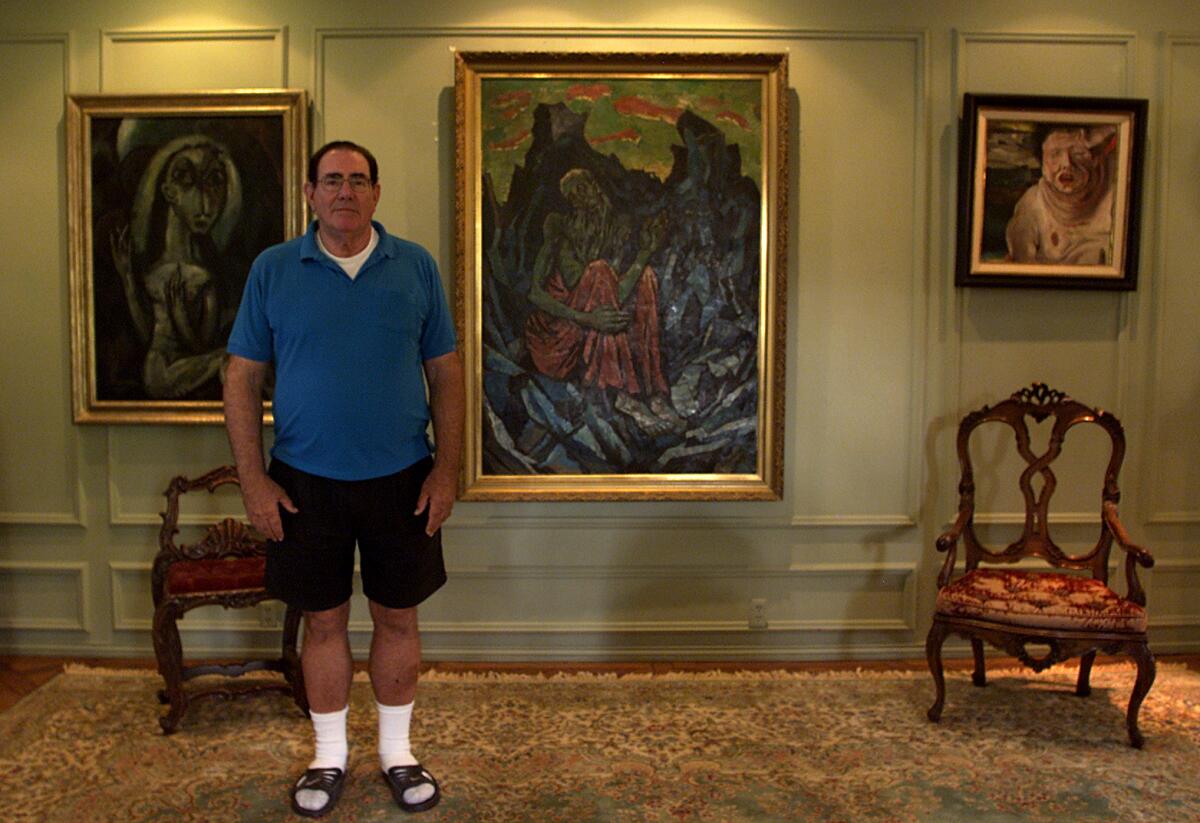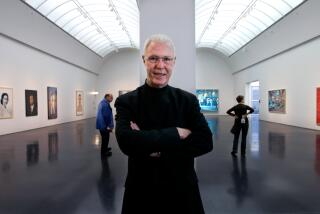Art collector Robert Rifkind, namesake of LACMA study center, dies at 91

Robert Gore Rifkind, prominent art collector and philanthropist, died Sunday at Ronald Reagan UCLA Medical Center in Westwood, his family said. He was 91.
A securities attorney for four decades, Rifkind built one of the most important known collections of German Expressionist art in the world. He donated his collection of about 5,000 works on paper and 4,000 related books to the Los Angeles County Museum of Art in 1983. It established the museumâs Robert Gore Rifkind Center for German Expressionist Studies, which now includes about 6,000 works on paper and 10,000 volumes and has become a resource for scholars, artists and students internationally.
Works from Rifkindâs collection have been featured in over 60 exhibitions at LACMA, said Stephanie Barron, the museumâs senior curator and head of modern art, and Rifkindâs third wife. The two had been living apart since 1998.
âAs a curator, that kind of easy access to a library and print collection â it was absolutely game changing,â Barron said. âIt really helped to establish LACMA as a juggernaut in terms of dealing in the subject of German Expressionism, and it put L.A. on the map.â
Rifkind was born and raised in a wealthy Beverly Hills family. Rifkindâs grandfather opened what was believed to be the first discount drugstore chain in L.A. Rifkindâs father was a lawyer, Joseph Rifkind, who later became a federal bankruptcy court judge. Rifkinâs mother raised the family, which included Rifkindâs younger brother, Richard.
Rifkind earned his bachelorâs degree in English from UCLA, where he was a varsity swimmer, and he graduated from Harvard Law School in the early â50s. He started practicing law in 1954, and in the early â70s he established Rifkind and Sterling (later Rifkind, Sterling & Levin).
Rifkind married three times, first to Mollie Katz in the early â50s, and then to Gogi Grant, a singer, in the late â50s. Rifkind and Grant had one son, Joshua Beckett, now 54. Rifkind met Barron in 1976 at a LACMA dinner celebrating an exhibition opening. They married in 1984 and had one son, Max Rifkind-Barron, 30.
Rifkindâs passion for German Expressionist art ignited in the early â70s when he visited an exhibition at the Pasadena Art Museum, now the Norton Simon Museum. He embarked on a two-year research project, reading about the art movement, before buying his first print. It was by Emil Nolde, and he bought it from La Cienega art dealer Orrel P. Reed Jr.
Rifkind was drawn to the intensity and rebellious spirit of the German Expressionists, he told the Times in 2001. âI love to be stimulated,â he said, referring to what it was like to live with such angsty artworks in his home. Ernst Ludwig Kirchner, Max Oppenheimer, George Grosz, Oskar Kokoschka, Erich Heckel, Emil Nolde and Max Beckmann are all represented in Rifkindâs collection.
Soon, Rifkind convinced Reed to close his shop and work for him full time, helping to build his nascent collection, Barron said. Rifkind had been collecting prints by early modern artists such as Matisse, Picasso and Chagall; the German Expressionists were less popular at the time in the mid-â70s â and more affordable â and the works spoke deeply to him.
âHe went at it with enormous gusto,â Barron said, adding that he not only acquired large numbers of works on paper from galleries, auctions and private sellers, but the literature that went with it. âThat was unusual for a private individual to do; usually itâs an institution,â she said. âThis was kind of old fashioned collecting, in terms of really digging deep into something that wasnât that popular at the time â it was scholarly.â
âBob Rifkind was fervently drawn to the Expressionistsâ engagement with the social and inner turmoil in which they found themselves,â added Timothy O. Benson, the Rifkind Centerâs curator. âWorld War I and Freud were, for him, the touchstones.â
Groundbreaking on LACMAâs new, Peter Zumthor-designed building, which will be 10% smaller, is planned for early 2020, at which point the Rifkind Center will move to its new home across Wilshire Boulevard, where the museum has office space and where it will remain for the foreseeable future. The Robert Gore Rifkind Foundation continues to fund programs and acquisitions at the center.
âLaw and art are very compatible sisters,â Rifkind told the Wall Street Journal in 1983. âBut law alone has never been creative enough for me.â
Rifkind is survived by Barron, his two sons and his brother.
More to Read
The biggest entertainment stories
Get our big stories about Hollywood, film, television, music, arts, culture and more right in your inbox as soon as they publish.
You may occasionally receive promotional content from the Los Angeles Times.











